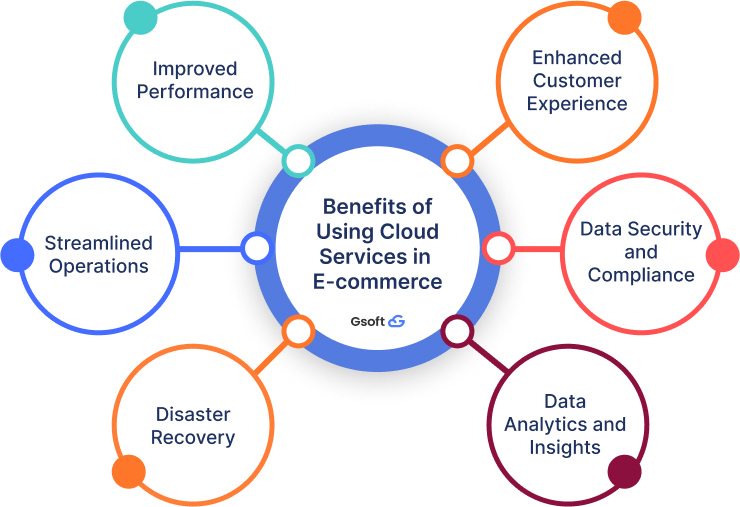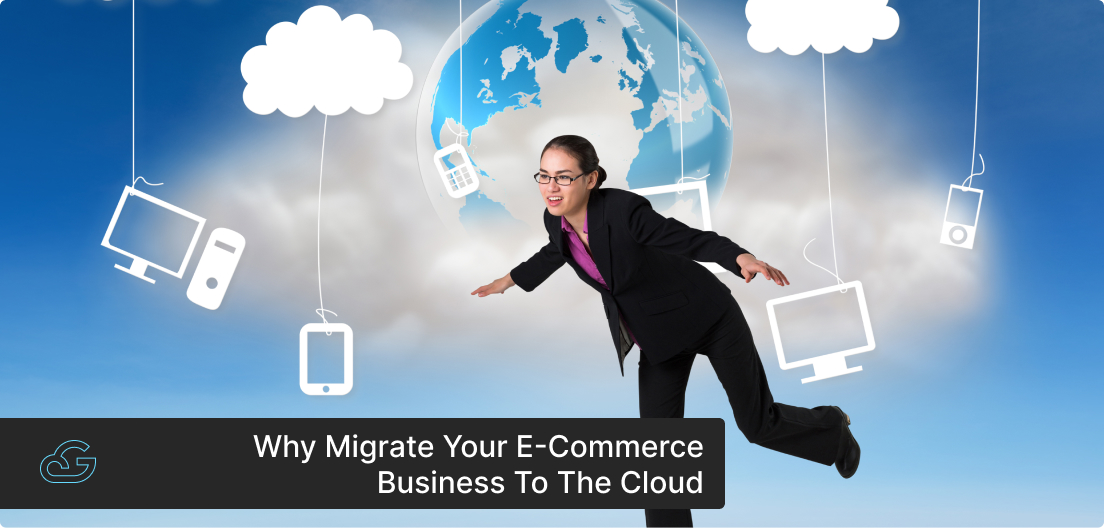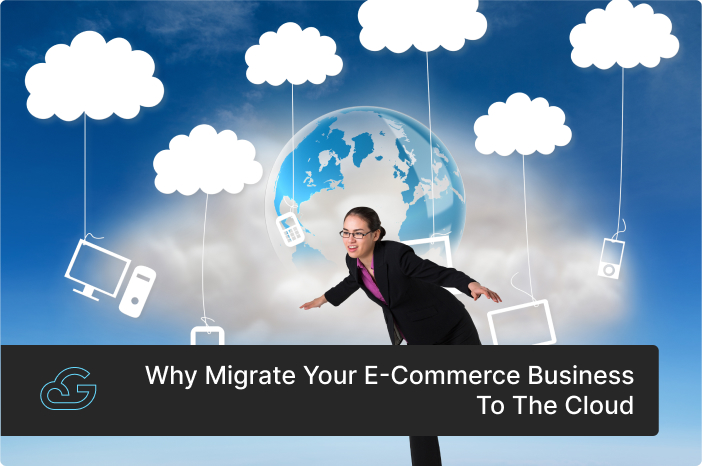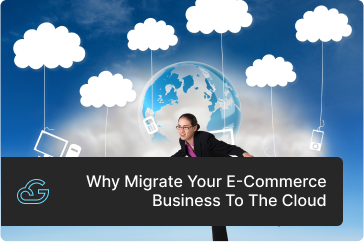Blogs / Migration & Modernization
Why Migrate Your E-commerce Business to the Cloud?
By
Sibin Vincent
Posted: December 12, 2023
• 4 min read
There are an estimated 12 to 24 million e-commerce websites across the globe, but less than 1 million of these sell more than $1,000 per year. To succeed, E-commerce businesses must maintain a competitive edge in today's swiftly changing digital landscape. You can expedite operations, improve customer experiences, and adapt to ever-changing market dynamics with the appropriate technology.
This blog discusses the numerous advantages of migrating your e-commerce website to the cloud, a change that can boost your online retail presence.
What is Cloud Migration?
In e-commerce migration, you move your current e-commerce platform to the cloud. This is called "lift and shift." Cloud migration is common for retailers who have already virtualized and/or containerized their e-commerce workloads. With this, they can focus on getting into the cloud quickly, with the goal of refactoring in the cloud later. This is usually the first step in a larger plan to change how e-commerce works, and it's also the fastest way to get into the cloud.
Why Should You Migrate Your E-Commerce Business to the Cloud?
- Scalability and Flexibility
- Cost Efficiency
- Reliability and Uptime
- Security
- Global Reach
E-commerce businesses often face fluctuating demands, especially during peak seasons. Cloud computing for e-commerce businesses offers the ability to scale resources up or down according to your needs, ensuring you can handle traffic spikes without over-provisioning.
Cloud computing in e-commerce businesses eliminates the need for upfront hardware and infrastructure investments. You pay only for the resources you use, reducing capital expenses and optimizing costs.
Leading cloud providers offer robust service-level agreements (SLAs) that guarantee high availability and uptime. Your e-commerce site remains accessible to customers, boosting reliability.
Cloud service providers invest heavily in security measures, including data encryption, identity management, and threat detection. E-commerce cloud migration often enhances your overall security posture.
Cloud data centers are distributed globally, allowing your e-commerce business to reach customers worldwide with low-latency access.
Key Benefits of Migrating an E-Commerce Business to the Cloud

- Improved Performance
- Enhanced Customer Experience
- Streamlined Operations
- Data Security and Compliance
- Disaster Recovery
- Data Analytics and Insights
Cloud-based solutions deliver faster load times and improved website performance, translating to a better user experience and higher conversion rates.
Personalization, recommendations, and responsive design are easier to implement in the cloud, creating a seamless shopping experience.
Cloud-based platforms offer centralized management of inventory, orders, and customer data, simplifying daily operations.
Leading cloud providers adhere to stringent security and compliance standards, safeguarding customer data and ensuring regulatory compliance.
Cloud platforms offer automated backup and disaster recovery solutions, minimizing downtime and data loss in case of unforeseen events.
Using cloud-based analytics tools, e-commerce businesses can gain valuable consumer insights and make data-driven decisions.
Now, the Big Questions are:
- Which cloud service model aligns best with your e-commerce goals?
- How can these models propel your business growth and innovation?
Types of Cloud Computing Services for Your E-Commerce Business
- Infrastructure as a Service (IaaS): Building Blocks of Your IT Infrastructure
- Offload critical infrastructure functions to your service provider.
- Gain all the features of an IT infrastructure without the need for on-premises facilities.
- Ideal for companies looking to offload hosting while retaining control.
- Perfect for large enterprises integrating ERP and CRM.
- Platform as a Service (PaaS): Your Custom App Development Playground
- Delegate operational maintenance duties to your service provider.
- Build customized applications for your e-commerce business.
- Ideal for businesses focused on app development and growth.
- Software as a Service (SaaS): Streamlined and Hassle-Free
- Use software without installation, easily accessible via the web.
- Leverage pre-set integrations for tailored solutions.
- Minimal software management – let the provider handle upgrades and support.
- Your vendor takes charge of security, maintenance, and compliance.
Imagine having a virtual data center at your fingertips. That's what IaaS offers!
Advantages:
Consider space that's the perfect middle ground between IaaS and Software as a Service (SaaS). It's PaaS!
Advantages:
Think about using software without the hassle of installation or local management. SaaS makes it easy!
Advantages:
How Can Cloud Computing Resolve Last-Mile E-commerce Delivery Problems?
Previously, e-commerce orders often took a week or longer to arrive, with limited package tracking and uncertain delivery windows. However, Amazon revolutionized the e-commerce industry by introducing free next-day deliveries and resolving last-mile delivery problems.
This is exactly where the services of Cloud step in!
- Real-time Tracking
- Efficient Routing
- Inventory Management
- Personalization and Recommendations
Cloud-based solutions enable real-time tracking of shipments, providing customers with accurate delivery updates and enhancing transparency.
Cloud services optimize delivery routes and schedules, reducing delays and improving delivery times, even in urban areas with traffic congestion.
Cloud platforms offer comprehensive inventory management capabilities, ensuring accurate stock levels and reducing the risk of overstocking or understocking.
Cloud-based analytics enable e-commerce businesses to provide personalized product recommendations and offers, increasing customer engagement and revenue.
Checklist for Successfully Migrating Your E-Commerce Site to the Cloud
Previously, e-commerce orders often took a week or longer to arrive, with limited package tracking and uncertain delivery windows. However, Amazon revolutionized the e-commerce industry by introducing free next-day deliveries and resolving last-mile delivery problems.
- Selecting the Right Cloud Platform
- Mapping Out Your New System
- Creating and Sending Requests for Proposals (RFPs)
- Involving All Stakeholders
- Compiling Total Cost of Ownership (TCO) and Revenue Model
- Migrating Your Data
- Testing Your Site
- Going Live
Choose a cloud platform that aligns with your business goals, whether it involves updating existing applications, migrating your e-commerce site, or adopting a microservices approach.
Determine which applications to retain and which to replace, considering how each touchpoint will be handled in the cloud environment.
Prepare and send RFPs to cloud service providers offering suitable solutions based on your chosen migration strategy.
Engage all departments and providers to ensure a comprehensive evaluation of cloud platforms and a seamless migration.
Forecast expenses and revenue for at least three years, factoring in all costs, including direct, indirect, and hidden expenses, to determine the true cost of migration.
Ensure a smooth transfer of data, including product information, customer data, SEO data, and workflows, using capable migration services.
Redesign and thoroughly test your e-commerce site to resolve issues before going live, ensuring a smooth transition.
Launch your revamped e-commerce platform, offering a better look and faster service to customers.
How Gsoft Helps E-commerce Websites Migrate to the Cloud?
Gsoft is a cloud computing service provider, that offers comprehensive cloud migration services, covering Infrastructure as a Service (IaaS), Platform as a Service (PaaS), and Software as a Service (SaaS) across multiple cloud models. We are a trusted cloud partner with strong relationships across major cloud players in the industry, including AWS, Azure, and Google Cloud Platform. Their capabilities include:
This is exactly where the services of Cloud step in!
- Strategy and Planning:
- Execution:
- Discovery & Analysis:
- Migration and Deployment:
Gsoft assesses your business models and collaborates on the right strategy for migrating your data and workloads to the cloud.
They employ efficient tools and automation in their battle-tested cloud migration frameworks to ensure seamless migration tasks, supported by accurate analytics to keep you on track.
In-depth discovery workshops uncover your current systems and processes, helping formulate the best strategy for your cloud migration journey.
Gsoft ensures a smooth transition of your applications, data, and systems to the cloud, making everything operational in the new cloud environment for ongoing management and optimizations.
Read Our Case Studies: Discover how our cloud migration solutions have empowered e-commerce businesses like yours.
Conclusion
Migrating your e-commerce website to the cloud is a strategic move to thrive in the digital era. Cloud computing provides scalability, cost-efficiency, security, and global reach. With the cloud, you can enhance performance, optimize operations, and transform customer experiences. In today's competitive landscape, the question is not whether to migrate but when. Start your cloud journey today and watch your e-commerce business reach new heights. Contact us to discuss your specific e-commerce migration needs.


Get Know More About Our Services and Products
Reach to us if you have any queries on any of our products or Services.











